Is Ackee Illegal in the Us? An In-Depth Exploration!
The ackee fruit, native to West Africa and popular in Jamaican cuisine, has been subject to scrutiny and regulation in the United States due to its unique characteristics and potential health risks.
Historically, the import and sale of ackee were heavily restricted because of the presence of hypoglycin A, a naturally occurring toxin within the unripe fruit that can cause severe illness.
The current legal status of ackee in the U.S. is nuanced, with specific guidelines in place that permit the import of only canned ackee that meets safety standards set by the Food and Drug Administration (FDA).
This introduction aims to explore the complexities surrounding the legality of ackee, examining the FDA’s regulatory framework and the implications for consumers seeking to enjoy this exotic fruit within the bounds of U.S. law.
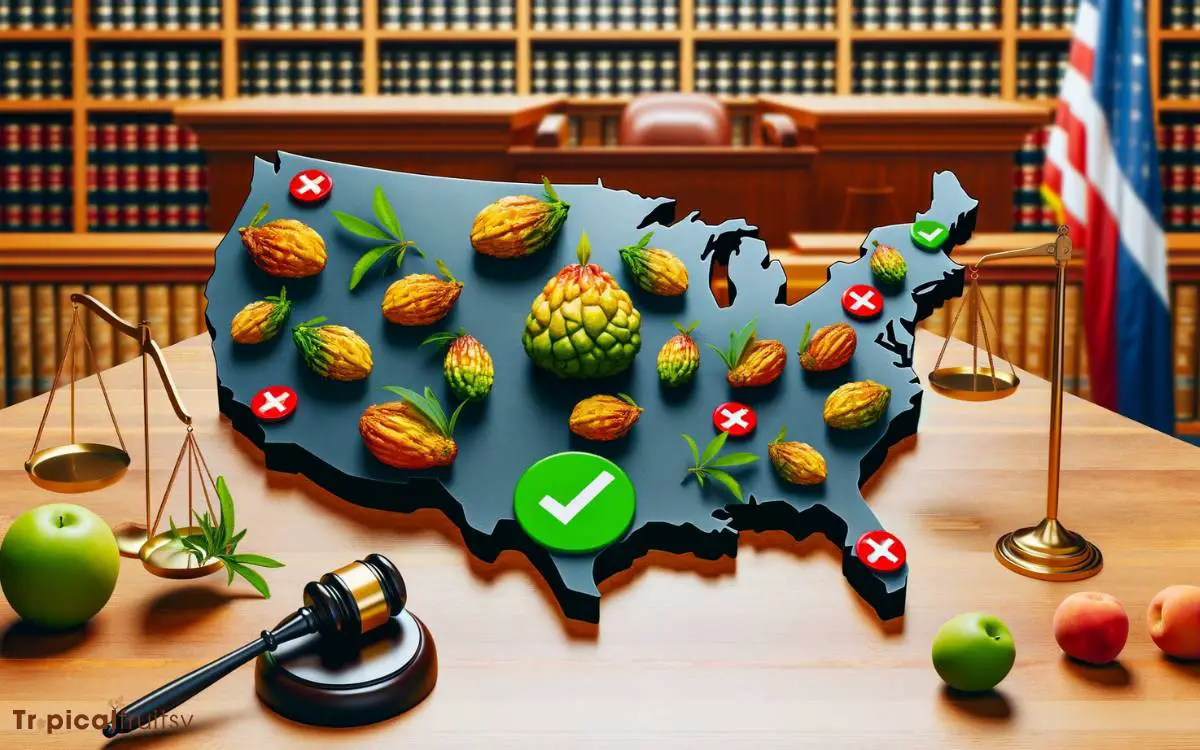
Key Takeaway
Understanding Ackee Fruit
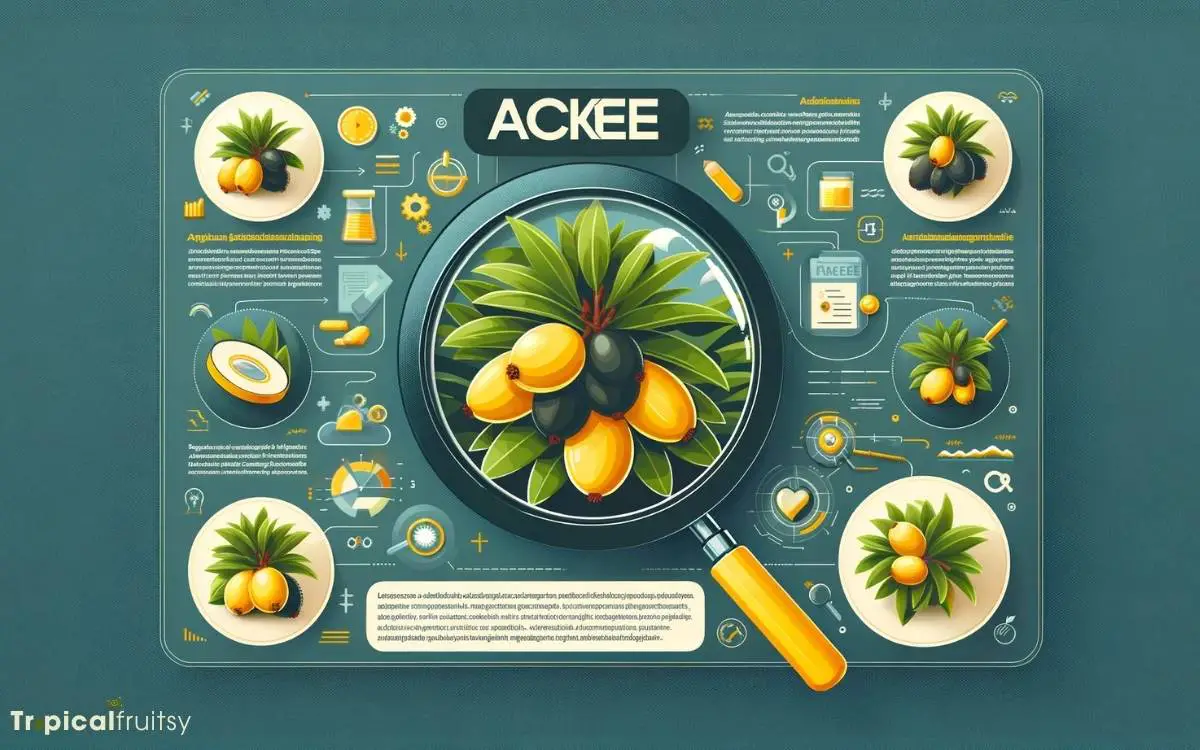
Originating from West Africa and a staple in Jamaican cuisine, ackee fruit is a distinctive tropical food known for its unique flavor and nutritional value, as well as its potential toxicity if improperly prepared.
Ackee, scientifically named Blighia sapida, is rich in essential fatty acids, vitamins, and minerals. However, its consumption is regulated due to the presence of hypoglycin A, a naturally occurring toxin found in the fruit’s underripe arils and seeds.
The ingestion of unripe ackee can lead to Jamaican Vomiting Sickness, a potentially fatal condition.
Therefore, the U.S. FDA mandates strict importation controls, allowing only the processed ackee arils that have been deemed safe for consumption.
This level of regulation evidences a precautionary approach to safeguard public health without compromising cultural dietary practices.
Historical Context of Ackee Regulations

The United States’ stance on ackee importation and distribution has evolved over the years, reflecting increasing knowledge of the fruit’s potential risks and the development of safety protocols.
As an analytical examination of the regulatory timeline reveals:
Historical milestones:
- Early 20th century: Ackee was virtually unknown in the U.S., with no specific regulations.
- 1970s-1980s: The FDA bans ackee due to toxicity concerns from hypoglycin A.
Safety measures and lifting of restrictions:
- 2000: Strict guidelines for importation introduced, allowing entry of canned ackee.
- Progressive updates: Ongoing research and adherence to safety protocols result in periodic adjustments to importation regulations.
Each regulatory shift has been a response to balancing the fruit’s cultural significance against public health imperatives, tailoring the legal framework to minimize risk while enabling access.
Current Legal Status in the US
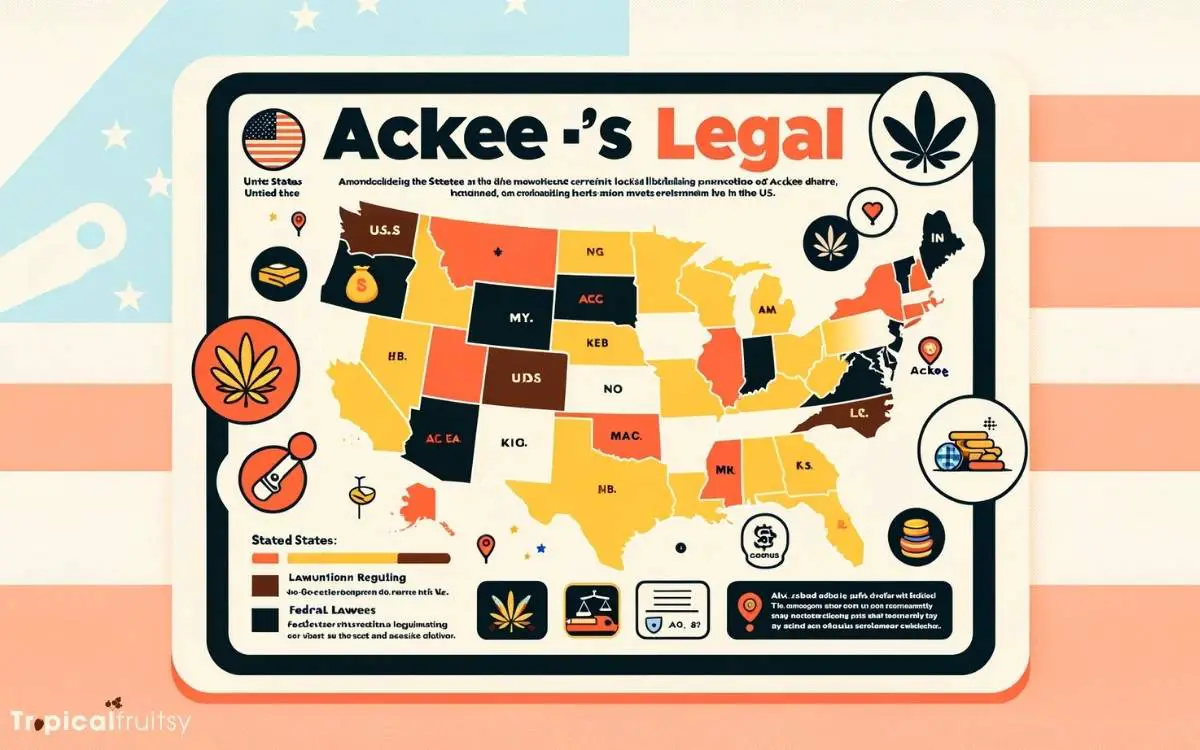
The legal status of ackee in the United States is governed by specific regulations set forth by the Food and Drug Administration (FDA).
These federal guidelines determine the conditions under which ackee can be imported and sold, focusing on ensuring the fruit’s safety for consumption.
Additionally, individual states may impose their own restrictions that either align with or further restrict the federal regulations on ackee.
FDA Regulations
FDA regulations permit the importation of canned ackee into the United States, subject to strict guidelines to ensure its safety for consumption.
The regulations are designed to protect public health by preventing the import of ackee that contains high levels of hypoglycin A, a naturally occurring toxin in the unripe fruit.
Guidelines for Importation:
- Ackee must be canned and commercially processed.
- The product is subject to testing for hypoglycin A levels.
Compliance and Enforcement:
- Inspections of processing facilities may be conducted.
- Importers must comply with the FDA’s Prior Notice of Imported Foods.
In this context, analytical scrutiny is applied to assess compliance with the mandated safety standards, ensuring that all canned ackee entering the U.S. market is fit for consumption.
State-specific Restrictions
While federal regulations allow for the controlled importation of canned ackee, individual states may impose additional restrictions on the sale and distribution of the fruit.
These state-specific regulations are often driven by concerns over the potential toxicity of improperly harvested ackee.
States engage in rigorous analysis to assess the health risks associated with ackee consumption and may decide to enact laws that further restrict or monitor the fruit’s market presence.
Consequently, businesses and consumers must be cognizant of not only the federal stance on ackee but also the varying legal frameworks that exist across state lines.
Adhering to these layered regulations ensures compliance and upholds public health standards, which is paramount given the unique nature of ackee as a food product.
Health Concerns and Toxicity
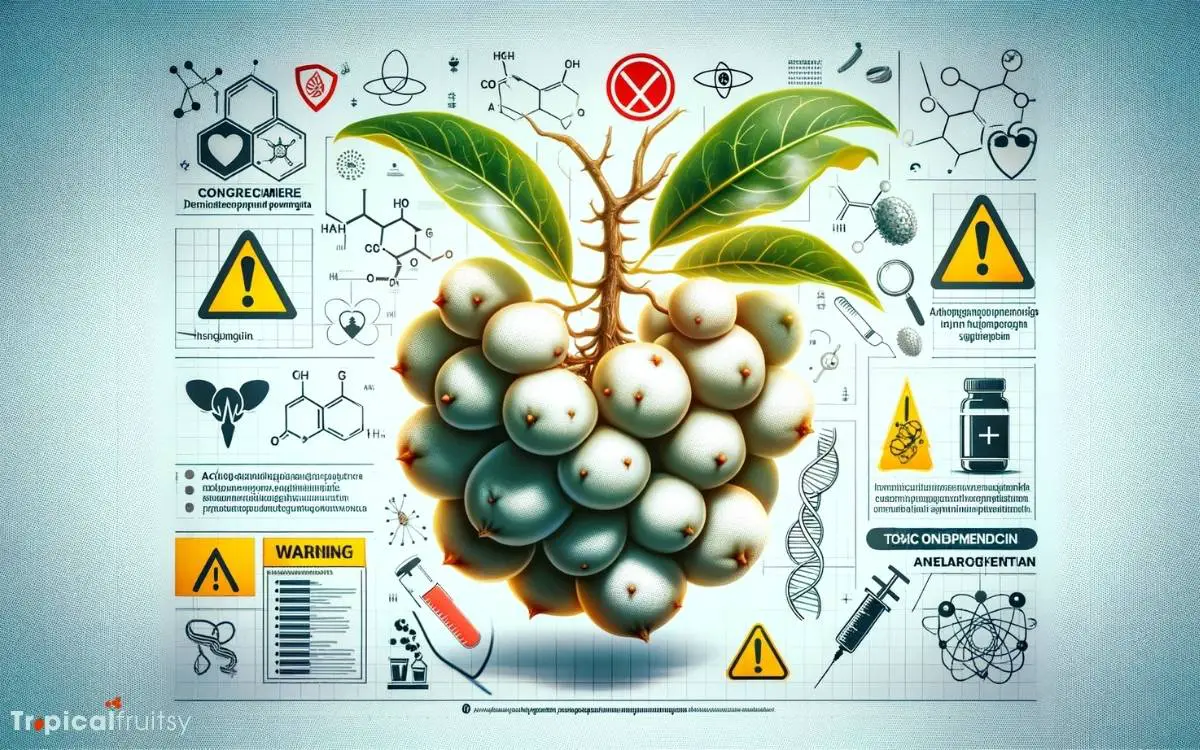
Regarding health concerns and toxicity, unripe ackee fruit contains dangerous levels of hypoglycin A, a naturally occurring toxin which can lead to severe illness or death if consumed.
This toxin is drastically reduced in properly ripened fruit, making it safe for consumption.
The primary health risks include:
- Jamaican Vomiting Sickness (JVS)
- Symptoms: Vomiting, hypoglycemia, lethargy, seizures, coma
- Long-term effects: Can be fatal if left untreated or in severe cases
To mitigate the risks, the U.S. has strict regulations:
- Importation controls
- Only canned, frozen, or processed ackee that passes FDA inspection is allowed
- Fresh ackee fruit remains banned due to difficulty in ensuring complete ripeness and safety
Consumers should only purchase ackee from reputable sources that comply with FDA regulations to avoid health risks associated with hypoglycin A toxicity.
FDA Regulations on Ackee
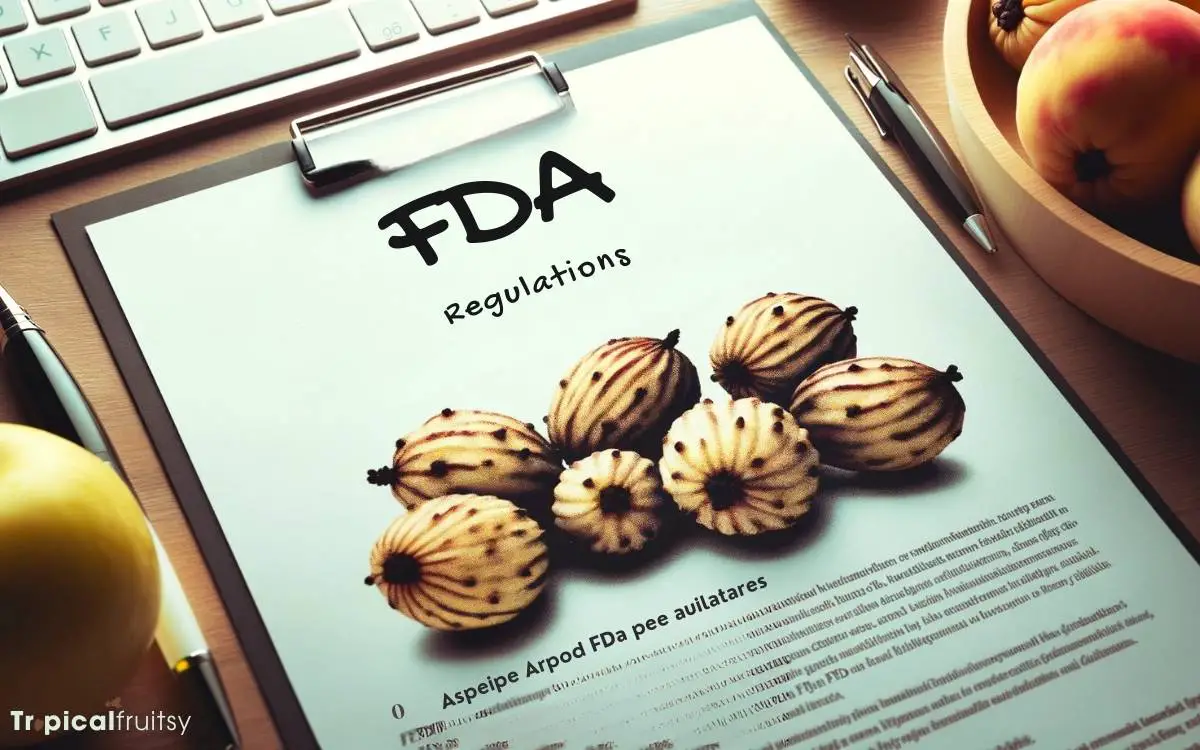
The United States Food and Drug Administration (FDA) imposes stringent restrictions on the importation and sale of ackee to protect public health from the risks associated with its toxin, hypoglycin A.
These regulations are part of the FDA’s commitment to ensuring the safety and proper labeling of foods entering the U.S. market.
The FDA stipulates that only canned ackee, which has been properly processed to mitigate the presence of hypoglycin A, can be legally imported.
The agency mandates that each lot of canned ackee be tested and found to contain levels of hypoglycin A below the established safety threshold before it is allowed entry into the United States.
Ackee fruits that are fresh, frozen, or inadequately processed are not permitted, reflecting the FDA’s rigorous approach to safeguarding consumers against potential health hazards.
How to Legally Obtain Ackee
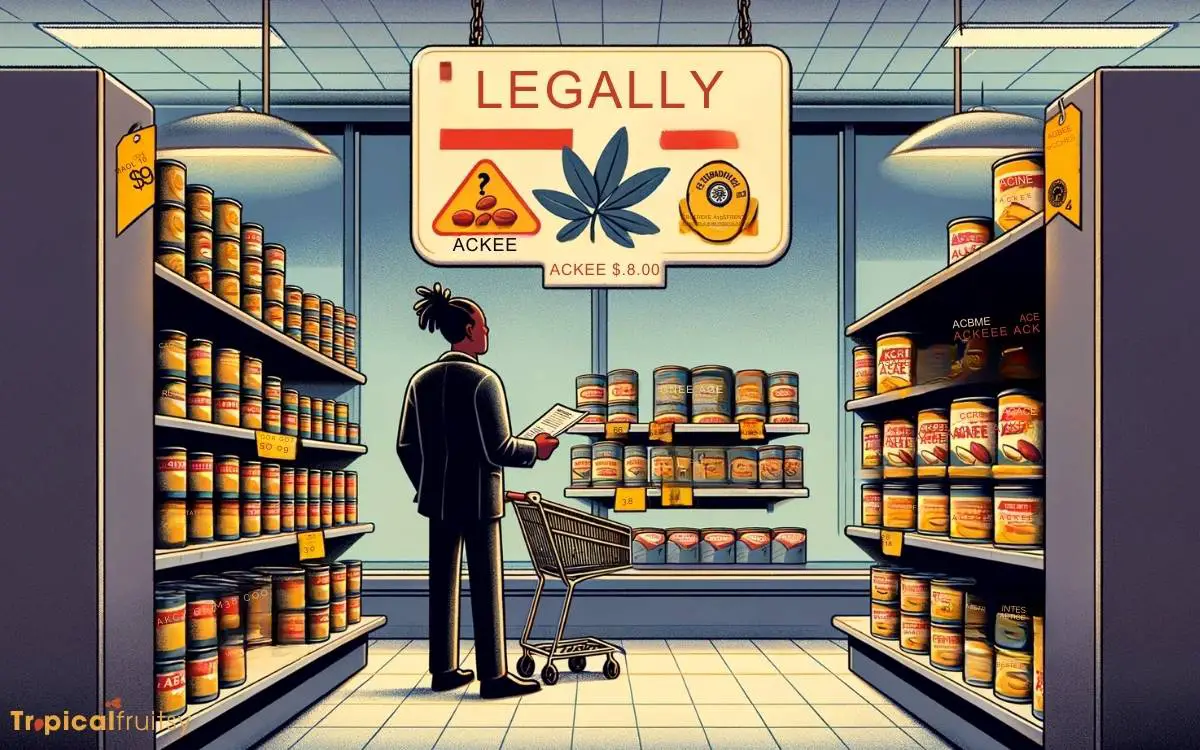
Ackee enthusiasts seeking to enjoy this exotic fruit within the United States can do so by purchasing FDA-approved canned ackee from authorized retailers or specialty food stores.
It is imperative to understand the requirements and processes that ensure the safe consumption of ackee:
FDA Approval
- Canned ackee must meet specific importation guidelines
- Must be processed to mitigate the risk of hypoglycin A toxicity
Retail Compliance
- Authorized retailers are required to only sell FDA-cleared ackee products
- Specialty food stores often provide a variety of compliant ackee brands
Consumers are advised to be vigilant and purchase only from compliant sources to ensure health safety.
Ackee in American Markets

Market availability of ackee in the United States has expanded significantly due to the adherence to FDA regulations, with consumers now finding canned ackee on the shelves of various specialty food stores and mainstream supermarkets.
This development is a direct result of stringent safety measures and consistent monitoring to ensure that imported ackee is properly processed, effectively reducing the risk of hypoglycin A poisoning.
| Emotion | Response |
|---|---|
| Relief | Access to safe ackee eases concerns for diaspora communities longing for a taste of home. |
| Joy | Culinary enthusiasts celebrate the inclusion of authentic tropical flavors. |
| Trust | Confidence in food safety protocols grows among consumers. |
The analytical overview of ackee’s market presence demonstrates a successful integration of cultural foods within the American food landscape while maintaining high safety standards.
Looking ahead, the future of ackee legality in the US appears to be on a path of broader acceptance and regulation.
Is There a Risk of Ackee Consumption Being Illegal or Linked to Health Issues in the US?
There is no established ackee and prostate cancer link in the US. However, due to the presence of hypoglycin in unripened ackee fruit, consumption can cause serious health issues such as vomiting, seizures, and even death. Plus, importing unripened ackee into the US is illegal to prevent poisoning incidents.
Future of Ackee Legality
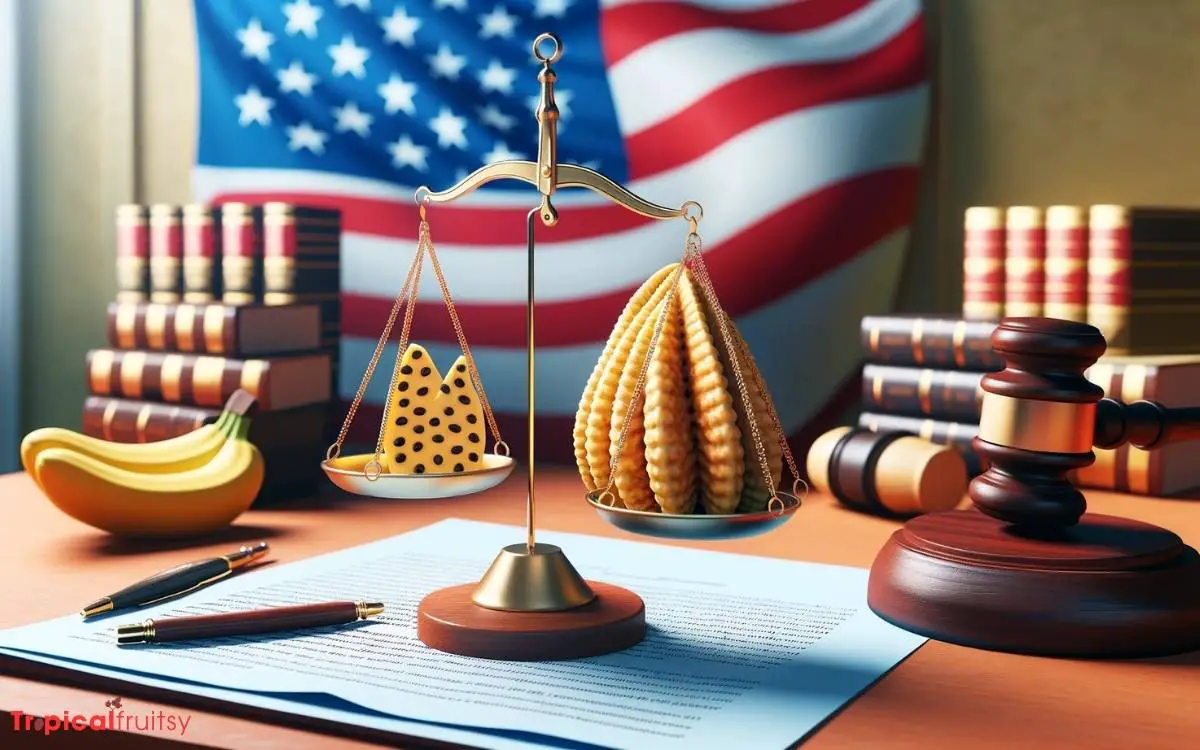
In light of the recent advancements in market availability and regulatory compliance, the legal status of ackee in the United States is poised for further review and potential expansion.
The future of ackee legality hinges on several factors:
- Comprehensive safety evaluations
- Analysis of hypoglycin levels in commercially available ackee
- Long-term health impact studies
- Legislative and trade developments
- Amendments to the Food, Drug, and Cosmetic Act regarding ackee
- Negotiations on import protocols with ackee-producing countries
The analytical approach to assessing ackee’s admissibility involves meticulous scrutiny of scientific data and adherence to stringent safety standards.
Stakeholders anticipate modifications in legal frameworks, reflecting a balance between public health interests and market demands for this exotic fruit.
Conclusion
Ackee fruit’s legal status in the United States reflects a cautious approach due to its potential toxicity when improperly harvested or prepared.
The FDA’s stringent regulations permit the import of only canned, properly processed ackee, mitigating health risks associated with hypoglycin A.
Despite its restricted availability, ackee maintains a cultural and culinary significance within diasporic communities, inviting continued scrutiny and regulation.
One notable statistic is that canned ackee represents over 90% of the fruit’s import into the US, underscoring regulatory compliance and consumer safety.






